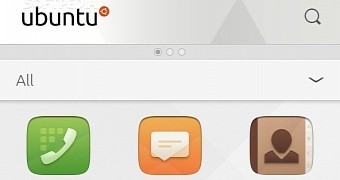The main focus for Canonical right now is the Ubuntu Touch operating system scheduled to show up on phones and in shops in a couple of months. The recent Ubuntu 14.10 launch and the start of the Ubuntu 15.04 development cycle has complicated things a little for the developers.
The regular procedure, at least until now, was to move the entire development of the Ubuntu Touch OS from the previous branch to the new one. That means that Canonical would normally move from Ubuntu 14.10 to Ubuntu 15.04 as a base, but that's not happening right now. The devs have already started an RTM branch for Ubuntu Touch, and moving to a new base would defeat its purpose.
Canonical wants to make the RTM (ready for manufacturing) release as stable as possible, but re-basing it right would break that stability. This leaves them with one option: to have two different branches, one used for RTM fixes and small changes, and another one using Ubuntu 15.04 as a base that can get all the new features that are way too unstable for the time being.
Ubuntu Touch now has two different active branches
To be fair, the Ubuntu devs already have a number of branches available for anyone who wants to test the new operating system, but until now most of the work used to be done on the RTM version, for various reasons. Users are also encouraged to get this particular version because it's the most stable.
"First of all: for now we still need everyone actively working on ubuntu-rtm as this is the archive that is used in the images targeting RTM. This means only the packages that ultimately land in 14.09 will be available for the end client to see - at least for now. Because vivid is a brand new series, some parts of the toolchain can differ from what we have in ubuntu-rtm."
"Therefore we can no longer (or at least no longer should) do the standard thing as before with binary copies from the currently developed series (vivid) to 14.09. We no longer can be as certain of complete binary compatibility. It is worth nothing though that upstreams that have really good understanding of their dependencies would still be able to do binary copies, but it is not recommended," says Canonical's Łukasz Zemczak.
This basically means that Ubuntu Touch 14.09 RTM (as it's officially called) will continue to get bug fixes, but all the big features that would be impossible to land in the RTM on a short notice will be made available in the new Touch branch based on Ubuntu 15.04. If there is something interesting that can make the transition from 15.04 to 14.09, then the devs and the testing department will take care of it.
As it stands right now, anyone with a Nexus 4 or Nexus 7 device can test Ubuntu Touch. The first phones that will be launched with Ubuntu come from Meizu and should be available in stores this December.

 14 DAY TRIAL //
14 DAY TRIAL //